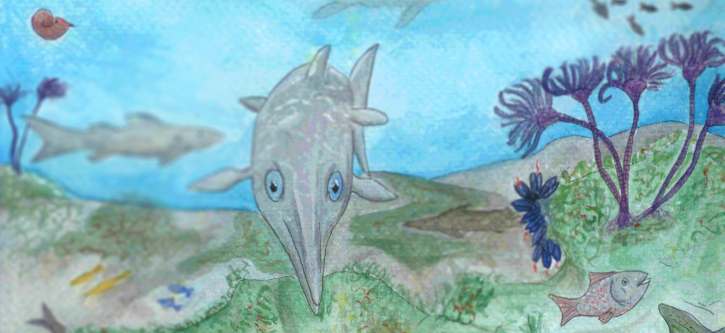In This Section
New study sheds light on life in ancient tropical seas

A new study sheds new light on the creatures that inhabited the tropical seas surrounding the UK at the start of the age of the dinosaurs.
Some 210 million years ago, the UK consisted of many islands, surrounded by warm seas. Europe at the time lay farther south, at latitudes equivalent to North Africa today. Much of Europe was hot desert, and at this point was flooded by a great sea – the Rhaetian Transgression.
The study was led by Valentina Rossi, who is a PhD student with Maria McNamara in the School of BEES, but conducted the research while an intern with Mike Benton at the University of Bristol. The study, published in Proceedings of the Geologists’ Association, is the most extensive ever published on the Rhaetian rocks and is based on more than 26,000 identified fossils of sharks, bony fishes, marine reptiles, and other creatures.
Valentina, who worked on the reptile remains, said “We found teeth and bones of ichthyosaurs and plesiosaurs, the classic great sea dragons of the Triassic and Jurassic.”
The new work has illuminates changes in marine ecosystems during a remarkable rise in sea level. The fossils even include dozens of examples of coprolites - fossil dung - some of which contain bones and scales of fish and reptiles – clear evidence of who was eating whom in those ancient seas.
Work by BEES PhD student Valentina Rossi sheds new light on life in ancient tropical seas https://t.co/OTfeO55WYc pic.twitter.com/IqB7IlyYmz
— School of BEES, UCC (@uccBEES) June 22, 2016
‘The Rhaetian (Late Triassic) vertebrates of Hampstead Farm Quarry, Gloucestershire, UK’ by Ellen Mears, Valentina Rossi, Ellen MacDonald, Gareth Coleman, Tom Davies, Caterina Arias-Riesgo, Claudia Hildebrandt, Helen Thiel, Christopher J. Duffin, David I. Whiteside, and Michael J. Benton in Proceedings of the Geologists’ Association
School of Biological, Earth and Environmental Sciences
An Scoil Eolaíochtaí Bitheolaíocha, Domhaneolaíocha agus Comhshaoil
Contact us
Distillery Fields, North Mall, University College Cork, Ireland , T23 TK30
